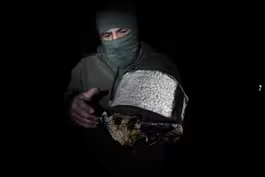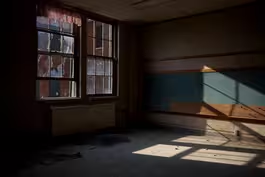
Russian system may have downed airliner, U.S. official says
Clip: 12/26/2024 | 9m 57sVideo has Closed Captions
Russian anti-aircraft system may have downed Azerbaijani plane, U.S. official says
There are early indications a Russian air defense system may have hit the Azerbaijan Airlines plane that crashed in Kazakhstan, a U.S. official says. Some of the speculation focuses on damage to the plane's tail section that could have been caused by shrapnel from an exploding missile. Stephanie Sy reports and William Brangham discusses the crash with retired Army Col. Robert Hamilton.
Problems playing video? | Closed Captioning Feedback
Problems playing video? | Closed Captioning Feedback
Major corporate funding for the PBS News Hour is provided by BDO, BNSF, Consumer Cellular, American Cruise Lines, and Raymond James. Funding for the PBS NewsHour Weekend is provided by...

Russian system may have downed airliner, U.S. official says
Clip: 12/26/2024 | 9m 57sVideo has Closed Captions
There are early indications a Russian air defense system may have hit the Azerbaijan Airlines plane that crashed in Kazakhstan, a U.S. official says. Some of the speculation focuses on damage to the plane's tail section that could have been caused by shrapnel from an exploding missile. Stephanie Sy reports and William Brangham discusses the crash with retired Army Col. Robert Hamilton.
Problems playing video? | Closed Captioning Feedback
How to Watch PBS News Hour
PBS News Hour is available to stream on pbs.org and the free PBS App, available on iPhone, Apple TV, Android TV, Android smartphones, Amazon Fire TV, Amazon Fire Tablet, Roku, Samsung Smart TV, and Vizio.
Providing Support for PBS.org
Learn Moreabout PBS online sponsorshipWILLIAM BRANGHAM: Welcome to the "News Hour."
There are early indications that it was a Russian air defense system that may have brought down the Azerbaijan Airlines jet that crashed yesterday, a U.S. official tells the "News Hour."
But Moscow has warned against making -- quote -- "hypotheses" before investigators make their verdict.
Some of that speculation comes from damage to the aircraft's tail section, which shows holes that could have been caused by shrapnel from an exploding air defense missile.
Stephanie Sy begins our coverage.
STEPHANIE SY: Eyewitness video shows the moment of impact.
Azerbaijan Airlines Flight J28243 crash-lands in Kazakstan.
A passenger describes the experience.
SUBKHONKUL RAKHIMOV, Plane Crash Survivor (through translator): Two times, it tried to land, and, on the third time, something exploded.
STEPHANIE SY: In the minutes before landing, video shows the plane descending erratically.
Azerbaijani officials say, by this point, the pilot was flying without GPS and with communications jammed.
Video from a passenger on board shows oxygen masks deployed and what looks like a crack on a piece of the wing,relative calm among the 67 people on board, and then this.
Fiery wreckage confronts these first responders.
More than half the people on the plane were killed in the crash landing.
Yet dozens survived, shaken and badly injured.
MAN (through translator): When the plane crashed, my wife was sitting next to me.
I haven't seen my wife since the crash, and I don't know where she is.
STEPHANIE SY: As the human losses are counted, investigators at the crash scene are homing in on the multiple holes found on the jet's hull as possible clues.
Azerbaijani officials say a preliminary probe indicates the plane was struck by a Russian air defense system and its communications were paralyzed by electronic warfare.
The Azerbaijan Airlines flight was en route from the capital, Baku, to the Russian city of Grozny.
Flight trackers show the plane's route changed midway over Russia and went off course, crossing back over the Caspian Sea to Kazakstan, where it crash-landed.
The plane was diverted in an area where Moscow has used air defense systems against Ukrainian drone strikes.
The incident hearkens back to 2014, when pro-Russian Ukrainian forces shot down a Malaysia Airlines plane, killing 298 people.
Brazil has joined the probe in Kazakstan, since the Embraer E-190 is Brazilian-made.
Today, in Azerbaijan, traffic came to a standstill as citizens observed a day of national mourning.
In silence, they laid roses and shed tears, all while families of victims wait for answers to a Christmas Day tragedy.
For the "PBS News Hour," I'm Stephanie Sy.
WILLIAM BRANGHAM: For some further perspective on what might be behind this tragedy, we turn to retired army Colonel Robert Hamilton.
He spent much of his career focused on the former Soviet Union, and he's now head of research at the Foreign Policy Research Institute's Eurasia Program.
Colonel Hamilton, so good to have you on the program.
You have a great deal of expertise in how the Russian military operates.
What do you make of this speculation that somehow Russia's air defense system was complicit in this crash?
COL. ROBERT HAMILTON (RET.
), U.S. Army: So, first of all, thank you for the invitation.
It's good to be with you, William.
I think we're in a case here where this is an Occam's razor-type situation, where the simplest explanation is most likely to be the accurate one.
So the evidence that we know that we have lines up with this theory that it was a Russian air defense system that shot this plane down, because we know that there was Ukrainian drone attack going on over Grozny at the time.
We know that the Russians were jamming GPS signals to try to fight that drone attack.
We know that Russian air defense was active in the area, and that this plane was descending the land at Grozny when it was shot down, or was beginning an ascent into Grozny when it was probably shot by this missile.
A missile would have exploded in proximity to the plane, which would explain the damage to the fuselage and the tail section.
The missile doesn't actually go into the plane.
So, all the evidence that we have at this point lines up with this explanation that it was very likely Russian air defenses that accidentally damaged this plane and then caused it to crash.
WILLIAM BRANGHAM: I understand the concept of fog of war, but how is it possible that ostensibly a modern air defense system mistakes a passenger jet for what might have been drones attacking Russian positions?
COL. ROBERT HAMILTON (RET.
): Yes, and that's a great question, and that's maybe the fundamental question here.
This is a massive error, right?
I mean, this is -- the Embraer, the type of aircraft you mentioned in the intro, that almost 70 people were on board, so this is much larger than even the largest of the Ukrainian drones that they're able to use to attack Russia, so a fundamental error in identification of the target, and then probably in the chain of command there's an error in allowing the unit to engage this target.
Someone in the loop, someone in the chain should have understood that what this was a civilian aircraft and not a Ukrainian drone.
WILLIAM BRANGHAM: So your sense is that there was some human error going on here, that this wasn't an automated mistake?
COL. ROBERT HAMILTON (RET.
): Exactly.
Yes, I mean, so Russian air defenses, the systems are fairly sophisticated.
What we're reading and hearing is that this was a Pantsir-S1, which is a short-to-medium-range air defense system that combines missiles with a 30-millimeter cannon.
If they thought they were shooting at Ukrainian drones, they actually could be using either.
In this case, it does appear that they use the missile to engage this aircraft.
But, yes, this wouldn't have been an automated identify and shoot.
Some humans in the chain would have made the decision to pull the trigger at this civilian airliner.
WILLIAM BRANGHAM: If this turns out to be the case, this obviously would not be the first time that the Russians have been credibly accused of bringing down passenger planes.
I mean, we should also say it's not the first time that the United States did this back in the late '90s with an Iranian-based plane.
Is this just the risk of operating civilian aircraft anywhere near where there is active conflict?
COL. ROBERT HAMILTON (RET.
): Well, yes.
And so I think we need to acknowledge too that the Russians made another error in not closing the airspace over Grozny to civilian aircraft.
If a Ukrainian drone attack was under way and Russian air defense was active around Grozny, then that airspace should have been closed.
No civilian aircraft should have been flying into that airspace.
And then to more directly answer your question, yes, this doesn't just happen to the Russians.
As you noted, the U.S. has done this in the past.
It does happen far more often to the Russians.
You mentioned MH17 in 2014, the Malaysian airliner, the Korean airliner in 1983 that the Soviet Union shot down and, again, didn't acknowledge for a long time until the collapse of the Soviet Union.
And the Russians still haven't acknowledged the shoot-down of the Malaysian airliner.
So it happens more often to Russian air defenses, mostly because of poor training and poor leadership.
And when it does, they don't admit it.
The U.S. tends to launch an impartial investigation, affix responsibility somewhere, and take corrective action to try to make sure it doesn't happen again in the future.
WILLIAM BRANGHAM: As my colleague Stephanie Sy reported, Brazil has sent -- is offering to send people to help with this investigation.
Can you explain to us why that's important?
COL. ROBERT HAMILTON (RET.
): Yes, I think the more international -- Brazil, because they're the manufacturer of the aircraft, the Embraer, but the more international this investigation is, the more credible it will be and the more likely we will know exactly what happened.
What I'm hearing and reading initially is, it'll be a team of Russian, Kazakh, because of plane crash in Kazakstan, and Azerbaijani specialists.
The problem there, is the Russian specialists will almost certainly ensure that whatever the final report is doesn't cast blame on Russia, although it's very likely that Russia is where the blame lies.
So having Brazilians, the representatives of the manufacturer of the aircraft involved, having other international experts involved will lend credibility to the investigation and make it more likely that we find out what actually happened.
WILLIAM BRANGHAM: It's obviously a little bit too early to tell this, but do you have any sense whether this affects anything on the ground as far as day-to-day operations within Ukraine and the Russians?
COL. ROBERT HAMILTON (RET.
): I think it's unlikely.
You know, I think the Russian military -- and this is going to sound sort of harsh or callous, but I really do think this is the calculus - - they would prefer the odd shoot-down, accidental shoot-down of a civilian airliner to refining their procedures and their air defense procedures in ways that may make it easier for an enemy to attack Russian targets.
So this is, I think, from the Russian perspective, again, sounds callous, but sort of the cost of doing business.
So I don't see many changes taking place.
I don't see many changes taking place in what they're doing in Ukraine.
If there's a way to blame this on Ukraine, the Kremlin will try and will retaliate in some way.
But I don't think it's going to have a major effect on the course of the Russian war in Ukraine, certainly.
WILLIAM BRANGHAM: All right, that is retired Colonel Robert Hamilton of the Foreign Policy Institute.
Thank you so much for being here.
COL. ROBERT HAMILTON (RET.
): Thank you.
As Arctic warms, communities face dramatic changes
Video has Closed Captions
Clip: 12/26/2024 | 3m 57s | As Arctic warms, Indigenous communities there face dramatic changes to their way of life (3m 57s)
Assad regime made billions producing, exporting party drugs
Video has Closed Captions
Clip: 12/26/2024 | 8m 31s | How the Assad regime made billions producing and exporting party drugs (8m 31s)
Claressa Shields on new film 'The Fire Inside'
Video has Closed Captions
Clip: 12/26/2024 | 7m 27s | Claressa Shields on 'The Fire Inside,' new film chronicling her journey to Olympic gold (7m 27s)
Colleges advise students to return before Trump takes office
Video has Closed Captions
Clip: 12/26/2024 | 8m 10s | Colleges advise some international students to return to U.S. before Trump takes office (8m 10s)
Investigation finds more deaths at Native boarding schools
Video has Closed Captions
Clip: 12/26/2024 | 6m 53s | Investigation reveals higher death toll at Native American boarding schools (6m 53s)
Providing Support for PBS.org
Learn Moreabout PBS online sponsorship
- News and Public Affairs

FRONTLINE is investigative journalism that questions, explains and changes our world.

- News and Public Affairs

Amanpour and Company features conversations with leaders and decision makers.












Support for PBS provided by:
Major corporate funding for the PBS News Hour is provided by BDO, BNSF, Consumer Cellular, American Cruise Lines, and Raymond James. Funding for the PBS NewsHour Weekend is provided by...





